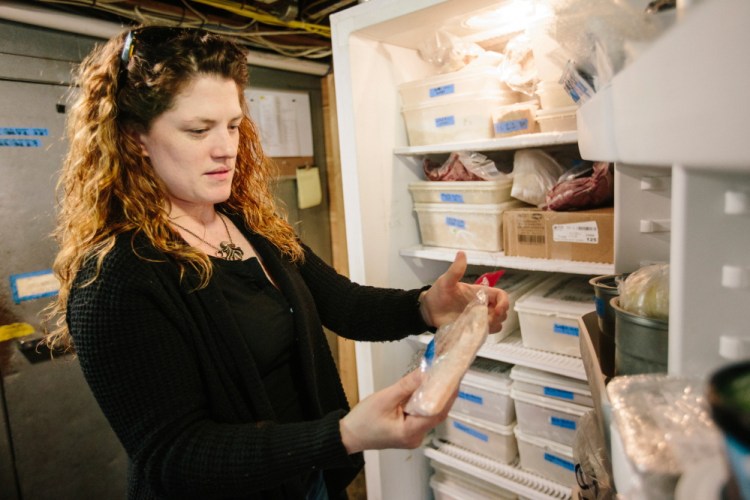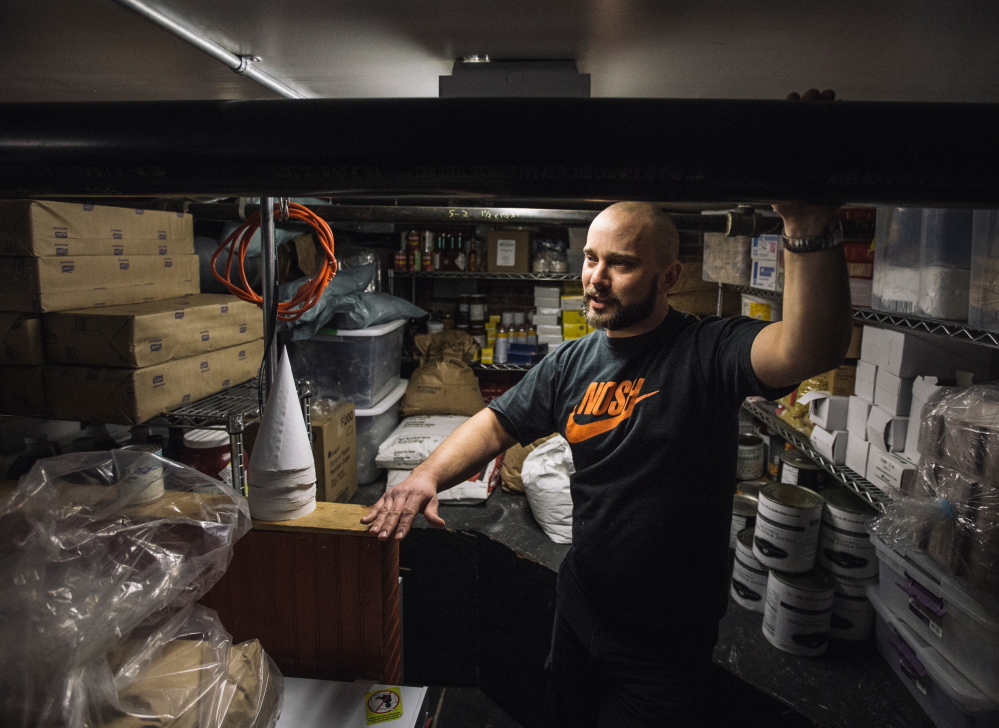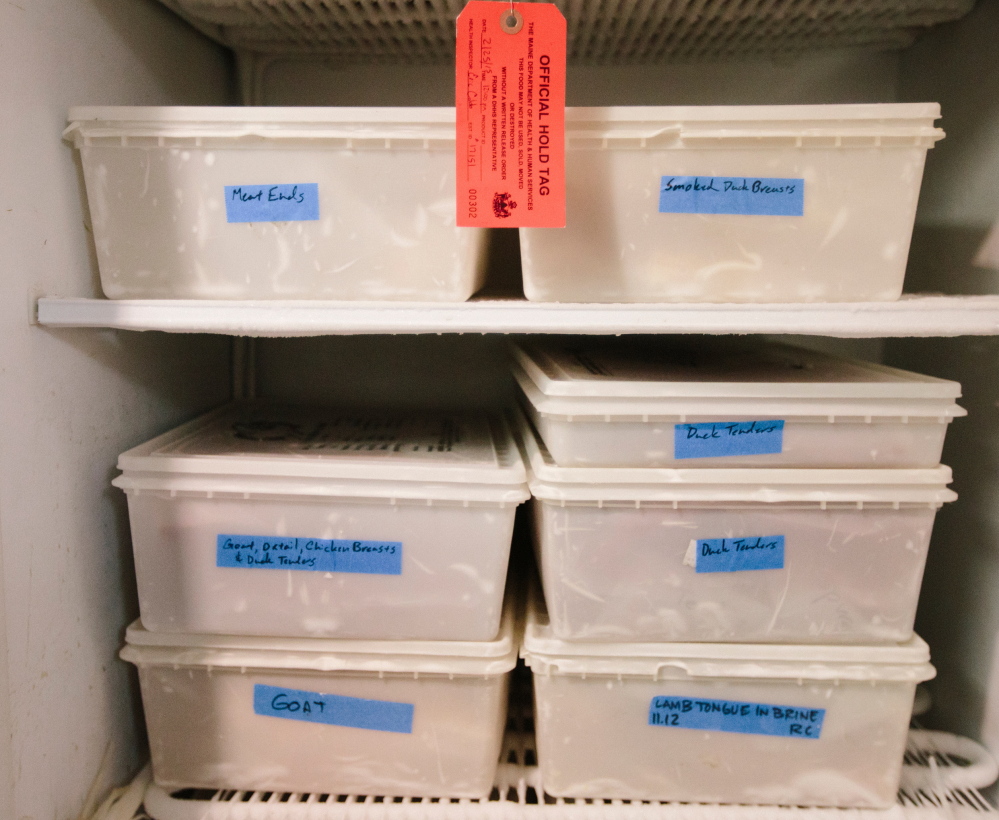Portland’s restaurants are on the cutting edge of the culinary renaissance in Maine, where locally sourced ingredients and inventive dishes are prized by award-winning chefs and consumers.
But efforts by health inspectors to bring local restaurants into compliance with federal regulations and reduce the risks of a potentially dangerous foodborne illness outbreak is splashing cold water on the sizzling creativity of many area chefs – at least temporarily.
In recent months, hundreds of pounds of meat have been embargoed by health officials and are waiting in cold storage until restaurants can prove the food is safe. Several restaurants have been ordered to stop vacuum-sealing their meats, cooking sous vide dishes and offering some types of house-cured meats until they develop special hazard plans and in some cases get formal variances from the Maine Food Code.
“These are high-risk processes,” said Michael Russell, who oversees Portland’s restaurant inspection program. “In Portland, we noticed a growth in specialized processing two years ago and a significant increase in the number of establishments using these practices within the past year.”
The city’s crackdown has caught many restaurants off-guard, and there is no clear process for getting plans and variances from the state food code.
No illnesses have been linked to the meats or the new processing methods in Portland. However, the risk of using these techniques incorrectly can accelerate the growth of dangerous bacteria and could result in botulism, which can be deadly. Even one severe illness could jeopardize the local food economy, which grew nearly 10 percent in 2014 to $293 million in Portland and 4.4 percent statewide to $2.36 billion, according to the Maine Restaurant Association.
Hazard plans are required by the U.S. Food and Drug Administration for large- and small-scale food producers. And all hazard plans for Maine restaurants are being sent to one professor at the University of Maine in Orono, who occasionally has to ship plans out of state for review. Health inspectors, meanwhile, are trying to educate themselves about cooking processes that expert chefs have already mastered.
“It’s been an open secret that all of the best restaurants in Portland have been using techniques that are not approved by the FDA without variance and (special) plans,” said Brendan Murray, the head chef at Duckfat. “There is a huge amount of talent and dedication to serving the best food in the city. The level is rising rapidly and that’s a good thing.”
Jason Loring, the owner of Nosh, agreed that these advanced techniques are widespread among experienced chefs, who are always looking for ways to express their culinary creativity and stand out among the growing number of award-winning restaurants in the city.
“Anyone who has any kind of ability to cook would obviously do this because it’s great stuff,” Loring said. “We love to make things. This is the epitome of making food.”
SMALL PROBABILITY, BUT HIGH RISK
Restaurants are required to develop special plans – called Hazard Analysis & Critical Control Points plans – for nearly 20 advanced food preparations, including vacuum-sealing, also known as reduced oxygen packaging, of raw and cooked meats on site, according to documents from the Maine Center for Disease Control and Prevention. Nine of those preparations, including pickling, curing meats and growing bean sprouts on site, also require a formal variation from the food code.
HACCP plans are required so health officials are confident these practices are being used safely. The plans require kitchen staff to log times and temperatures of the food product at all phases, from the delivery truck to the dining room, and outline practices for preventing contamination.
“It forces them to look at the hazards and where things can go wrong and document that they are doing things correctly,” said Jason Bolton, an assistant extension professor and food safety specialist at the University of Maine Cooperative Extension who reviews the HACCP plans.
Vacuum sealing can increase the shelf-life of food, allowing restaurants to freeze products without the risk of freezer burn. Sealing is also necessary when cooking in a sous vide style, a process of immersing a sealed pouch of food in a hot water bath for extended periods of time.
If the sealing is done incorrectly, bacteria that cause botulism can find themselves in the ideal environment to grow, Bolton said. Even though the probability of a serious foodborne illness outbreak is low, the possible outcome could be dire.
“As soon as you remove the oxygen, (bacteria have) the ability to grow,” Bolton said. “With these higher-risk foods, (the potential consequence) is death.”
Requirements for HACCP plans and variances have been on the books since at least 2001, Russell said.
The city is now focused on bringing restaurants into compliance in response to more and more restaurants using the practices.
On Feb. 25, the city sent an email to 150 restaurants it believed could be affected by the new enforcement practices. About 20 responded to the city seeking more information, Russell said. Other restaurants using these practices without approved plans will be dealt with during their regular inspections.
“I think they’re trying to get their heads around what they need to do,” Russell said.
William Marler, a Washington-based attorney who specializes in foodborne illness outbreaks, says health officials are right to focus on these practices. Marler said “bacteria doesn’t care” whether the food is mass-produced or locally made in a high-end restaurant.
Marler said he is currently working on a case in which people apparently got botulism from jarred pesto that was purchased at a gourmet farm stand at a high-end country club in California. One woman was hospitalized, he said.
“Botulism is something you don’t want to mess with,” Marler said. “The city is definitely in its right to protect us.”
EMBARGOED MEAT
Three Portland restaurants have had some meat embargoed by health officials in recent months, meaning they will need to have it tested for safety or throw it all away.
Duckfat had 80 pounds of vacuum-sealed meat put in cold-storage purgatory after the restaurant was inspected on Feb. 25. During prior inspections dating to 2013, the restaurant was required to throw away 6 pounds of vacuum-sealed tuna and was cited for curing its own bresaola, a salted, whole-muscle beef that’s air-dried for up to three months, without an HACCP plan.
General manager Ashley Shane said she has received conflicting accounts from health officers about the fate of the embargoed meat – including duck breasts, pork, beef and chicken – with an estimated value of $1,000. The product is now stored in a freezer with a bright orange tag from the city, indicating it’s on hold.
“There’s some really beautiful local meat product in there that we can’t use,” said Shane, as she stood in the Middle Street restaurant’s prep area next to a vacuum sealer, valued at $5,000, with a bright orange “Do Not Use” sign on it.
On Congress Street, Nosh has 301 pounds of beef brisket that was cured using pink salt locked away in a freezer, after health officials ordered an embargo on Feb. 11. Curing – which preserves and seasons meats with nitrates such as pink salt – without an HACCP plan was listed on the inspection report as a repeat violation.
Loring, the owner, fears that having the meat tested will be too expensive, so he will likely have to throw it away. He valued the meat at about $2,000, but his head chef, Noah Leether, said the restaurant could lose closer to $4,000, considering the food’s retail value.
“I feel like we’re being penalized for making hand-crafted products,” Loring said. “We try to keep all of our money in the state by buying animals in this state and making our own products.”
Loring said he has been curing meats without incident for the last five years using pink salts, a flavor-enhancing food preservative that can be toxic in high doses. In recent years, he has stopped curing his own full muscle meats, like hams.
“I just saw the writing on the wall,” he said.
Farther down Congress Street, near Maine Medical Center, Salvage BBQ had “all food on-hand” embargoed as the result of a Jan. 13 inspection. Head Chef Josh Craigue said that resulted in 100 pounds of original sausage and homemade bacon being tagged and stored in the freezer until further notice.
Craigue said he still grinds his own meat to make sausage and cures it in a casing for two days. But he is no longer using pink salt to help preserve the meat, kill bacteria and prime the casing to better absorb additional flavor when it is hot-smoked.
As a result, the flavor and color of the sausage change a little, but not enough for most people to notice, he said.
“It was a little disheartening to have to change that,” he said. “That flavor is something you can’t replace.”
Craigue said he is currently in the process of developing HACCP plans so he can resume his preferred curing methods and perhaps offer a variety of charcuterie (a general term for the craft of making pork products like salami, sausages and prosciutto), pates and sausages.
“I’m excited about it so I can do more stuff above-the-board and not have to worry about it,” he said.
SOUS VIDE
Sous vide – French for “under vacuum” – dishes have been the subject of study and debate for years, because they combine vacuum-sealing with a cooking process that keeps products at or near the so-called “danger zone” for bacteria growth – 41 degrees to 135 degrees – for extended periods.
If the vacuum-sealing is done correctly, the meats are sealed when there is little chance of bacteria being present. That allows the meats to cook for extended periods at low temperatures, without bacteria contaminating the food.
Health officials in New York City have been cracking down on restaurants for cooking sous vide without the required plans and variances. High-profile enforcement actions were taken in 2006 and 2008 in that city, forcing restaurants to throw away hundreds of pounds of meats.
Sous vide cooking requires a variance from the food code partly because meats, such as beef steaks, may not reach the minimum cooking temperature of 145 degrees required by code. Instead, a vacuum-sealed pouch of beef can sit in a hot water bath of 135 degrees for days before being served.
Eve’s at the Garden, the restaurant in the Portland Harbor Hotel, failed an inspection on Oct. 27, 2014, with only four violations, all of them related to advanced food techniques. The restaurant was curing meats with pink salts, offering sous vide short ribs and vacuum-packing raw fish, beef, poultry and pork without an HACCP plan.
Head Chef Anthony St. Peter said the restaurant has offered sous vide dishes for years without incident. St. Peter said he vacuum-sealed raw short ribs and cooked them for 72 hours in a hot water bath at 145 degrees.
“It allows you to cook an item for a longer period of time without compromising texture and juiciness of the protein,” he said. “It’s the same context as braising.”
He also likes to cook a Cornish game hen 90 percent of the way, then quickly cool it to an appropriate temperature before placing it in a pouch with a marinade and vacuum-sealing it. He finishes cooking it in a hot water bath, where a special machine regulates the temperature, when the dish is ordered.
“I just stopped using it,” he said of sous vide. “We’re back to old-school searing and braising.”
St. Peter said he is in the process of developing plans to resume the practice. Offering sous vide dishes helps him stand out in Portland’s restaurant scene and encourages conversations among chefs, servers and customers, he said.
“Just the word brings up a New Age fusion feel,” he said. “The things you can create and play with as a chef are so intriguing.”
ENFORCEMENT PROCESS PANNED
Restaurant owners are frustrated that health officials have not given them more time to prepare their HACCP plans or apply for variances before taking enforcement action.
Greg Dugal, who heads the Maine Restaurant Association, said health officials are right to enforce food codes but could have done more to warn restaurants before embargoing meats.
“The state and the city could have done a better job of letting people know,” Dugal said. “People are doing something they have always done and now they could lose money” because of enforcement actions.
The city sent an email Feb. 25 to more than 100 restaurants it believed would be affected by the new enforcement action, but not everyone received it.
“They came and they cracked down on us and they didn’t have any answers,” said Shane, the owner of Duckfat, whose food was embargoed the same day the email was sent. “We’re trying to do the right thing.”
Health inspectors, meanwhile, have been taking classes at the University of Maine in Orono to learn more about the practices that local chefs have already perfected.
Bolton, at UMaine, said that health inspectors are trying to get up to speed about the new techniques, a situation that has presented a challenge when enforcing the rules. Several chefs noted that they have had to educate health inspectors about the techniques they are using.
“One of the challenges is getting all of the inspectors up to date,” Bolton said. “People are coming in at all different levels of knowledge. It’s a complicated system.”
Currently, Bolton is the only person reviewing HACCP plans for Maine restaurants. He does that between his regular duties of teaching college courses, conducting research, advising three master’s students, training health inspectors and reviewing HACCP plans for cheese and large-scale food producers.
“This is pretty new,” Bolton said. “Trying to get everyone on the same page is hard.”
A PINCH OF ANXIETY
With the summer tourist season around the corner, several restaurants are feeling the pinch.
King Bishop, the head chef at Street & Co. on Wharf Street, said he has been waiting for a month and a half to get his HACCP plan approved so he can resume curing his own pork belly bacon and salmon. He had been curing meats with pink salts for the last seven years.
He ceased using pink salts on Oct. 15, 2014. According to the inspection report, the restaurant was also dry-curing duck breasts and using pink salt without an HACCP plan.
“Right now, I’m waiting to hear back from a college professor who, I’m sure, is very busy right now,” Bishop said. “I think the city and state just aren’t prepared for this. Maybe having someone else in place who actually understands the law and that’s their job would be really beneficial.”
Bishop said that curing his own meats is one way to make Street & Co. stand out in a foodie city filled with restaurants that rely on local food and drink.
“We put it on our menu as house-cured bacon and that just makes people’s eyes kind of pop,” he said. “For us, it sort of adds value to our product.”
Bishop said the curing process becomes more urgent in the spring, when the restaurant begins getting fresh, wild salmon shipped overnight from Alaska.
“To not have that cured salmon on my menu for the spring and summer would be a little frustrating,” he said.
–––––––––––––––
CORRECTION: This story was updated at 2:07 p.m. on March 30, 2015, to correct the title of Ashley Shane.
Copy the Story Link
Send questions/comments to the editors.






Success. Please wait for the page to reload. If the page does not reload within 5 seconds, please refresh the page.
Enter your email and password to access comments.
Hi, to comment on stories you must . This profile is in addition to your subscription and website login.
Already have a commenting profile? .
Invalid username/password.
Please check your email to confirm and complete your registration.
Only subscribers are eligible to post comments. Please subscribe or login first for digital access. Here’s why.
Use the form below to reset your password. When you've submitted your account email, we will send an email with a reset code.